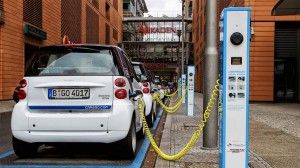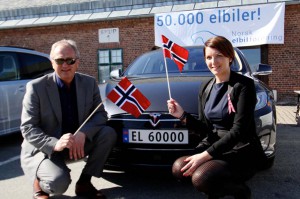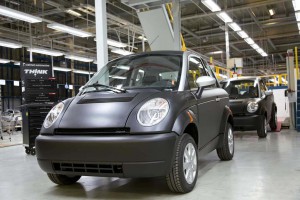It has massive offshore oil reserves that have helped fuel its economy, but as far as millions of Norwegian motorists are concerned, they’d rather spend their money on an electric vehicles.
Battery-cars accounted for a record 31.2% of all new vehicles sold in the Scandinavian nation last year, according to the Norwegian Road Federation, up from 20.8% in 2017. And the shift away from gas and diesel is only expected to accelerate as Norway has set a goal of eliminating sales of vehicles using internal combustion engines by the middle of the decade.
Last year’s surge “was a small step closer to the 2025 goal,” Oeyvind Solberg Thorsen, head of the NRF, told a news conference in Oslo on Wednesday.
(Tesla misses sales target, cuts prices. Click Here for the story.)
Norway is by no means the largest BEV market in the world. While final figures are still being calculated, that crown is all but certain to go to China, where sales jumped by more than half in 2018 and demand in November alone for plug-based models hit a record 140,000. On a pure volume basis, the U.S. was the second-largest market. But pure battery-electric vehicles were expected to account for less than 4% of total Chinese new vehicle sales last year and barely 2% in the States.

The Norwegian government offers a number of incentives to promote EVs, including subsidized charging.
From a percentage basis, Norway was, by far, the global leader, Iceland coming in second, Sweden third.
There are a number of factors behind the Norwegian love affair with electric vehicles, including a cultural predisposition towards green technologies. But there are other, more practical motivations, as well. Sales of conventional vehicles are heavily taxed. A gas-powered version of the Volvo XC90, for example, costs 919,000 koners, or $106,000 U.S. dollars. An American would pay $47,000 for the SUV.
(Hyundai is billing its Elevate concept as the “ultimate mobility vehicle.” Click Here to check it out.)
Most vehicle taxes are waived on battery-cars, however, more than obviating the typically higher cost of electric vehicles. Owners also get such benefits as free parking and free use of electric charging stations in many locations. Add the fact that automakers are rolling out a flood of new long-range battery-cars and the appeal is expected to keep growing over the next few years.
The lobbying group, the Norwegian Electric Vehicle Association, is confident enough to predict the country will be able to hit the 2025 target of eliminating sales of new gas and diesel vehicles, but not everyone is convinced.
“Strictly speaking I don’t think it’s possible, primarily because too many people don’t have a private parking space and won’t want to buy a plug-in car if they can’t establish a charging point at home,” Lasse Fridstroem, an economist with Norways Institute of Transport Economics told the Reuters news service on Wednesday.
But even then, Fridstroem tempered his pessimism by suggesting it will be possible to get to a 75% market share for BEVs by mid-decade – “provided that the tax breaks are maintained.”
But there’s the rub. Every new battery car sale translates into tens of thousands of dollars that won’t go into government coffers, and the country now has to start thinking about alternate means to make up that revenue. That could become an even bigger issue in the years ahead, now that Norway’s North Sea oil reserve are starting to be deplenished.
Norway isn’t alone here. In the U.S., for example, several states have begun considering ways to tax EV owners to make up for the gas taxes they don’t pay. In the future, experts say, battery-car owners may wind up having to pay by the mile – or by the kilometer in Norway.
The government does have a financial reason to back increased EV sales, however. It is currently spending billions of dollars to buy credits from the European Union for greenhouse gas emissions. It hopes to slash that by boosting zero-emissions vehicles, helping offset the subsidies it has been offering.
(VW tests new portable EV chargers. Click Here to find out more.)
The country’s love affair with battery-cars dates back quite some time. Long before Tesla, a small Oslo-based start-up, Pivoc, began producing an all-electric microcar. Renamed Think, the company was taken over by Ford Motor Co. in 1999. But the U.S. automaker’s grand plans failed to materialize. It sold the Norwegian subsidiary off and, after a series of investors failed to get it off the ground, the company folded in 2011 – just as the global battery car market started getting charged up.
Nissan is now the Norwegian market’s largest supplier of battery-electric vehicles, with its second-generation Leaf model recently debuting. Other strong brands include BMW, Volkswagen and Tesla.


